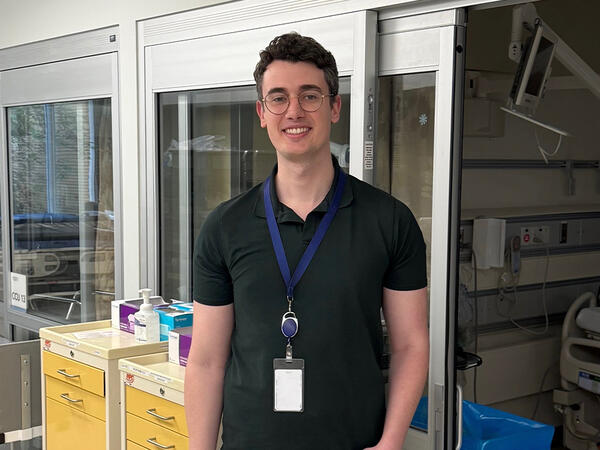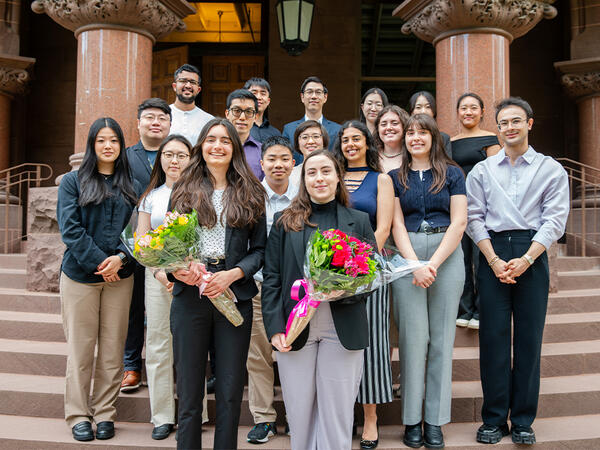Karen Ng received Industrial Pharmacy Residency Program Award for major project to develop artificial intelligence tool for use in industry
Karen Ng, a 2T0 graduate of the Doctor of Pharmacy (PharmD) program at the Leslie Dan Faculty of Pharmacy, is carving out a unique niche for herself in the pharmaceutical industry with her experience in artificial intelligence (AI). Ng recently received the 2021-2022 Industrial Pharmacy Residency Program Award, which honours a resident who has demonstrated exceptional leadership and completed a high-quality major project during the residency, recognizing a project she spearheaded to develop an AI program that enhanced and expanded the capabilities of the company’s medical affairs and commercial teams.
“My approach to AI is that it’s not there to replace people’s jobs. It’s a tool to aid with mundane tasks or processing large data sets,” says Ng. “At the end of the day, a person makes the decision about what to do with the data, but AI is an extra tool that can provide some external support.”
Ng started the industrial pharmacy residency in 2021, working mainly in the medical information department at Leo Pharma. One of her main responsibilities was to address inquiries about the company’s medications from health care professionals and patients.
“The PharmD program taught us how to read and analytically evaluate literature and deliver messages in different ways, whether for patients or other health care professionals,” she says. “We learned how to speak to patients and make sure they understand the information and have empathy toward them. I feel very confident in my analytical skills because of the practice I had in the pharmacy program.”
Ng says that while working with the medical affairs and education team, she saw the potential for AI to improve efficiency and address some of the challenges of the role.
“These interactions are unique because they are usually unsolicited, and I saw that there was great value in these interactions to understand the needs and questions of patients and health care professionals,” says Ng. “That’s when I got the idea that we should be able to do something with all these interactions to help better guide medical affairs initiatives.”
In the medical information role, logging inquiries and responses in a database is crucial for compliance and for understanding how colleagues previously handled similar inquiries. But using keyword and category searches of the inquiries could be challenging: Similar inquiries could be tagged differently based on language variations between patients and health care professionals, and individual personnel might categorize inquiries differently. As a result, the search function was often ineffective, and identifying trends was difficult and time-consuming.
In her residency’s major project, Ng leveraged her interest in AI and computer programming to tackle this pain point by developing a machine learning tool that uses natural language processing to streamline the inquiry search process. She also collaborated with medical science liaisons and commercial team members to ensure that the tool also allowed for improved data visualization and trend identification.
After presenting the tool, dubbed MUFASA (Medical information data Uses For AI Semantic Analysis), to her colleagues in the medical information department, her managers encouraged her to share it with the cross functional managers. They saw value in the tool to understand and visualize trends and geographical clusters in inquiries so that they could make more strategic decisions about their work.
With the support from her Canadian colleagues, she was also given the opportunity to present the tool to the medical information team at Leo Pharma’s global headquarters in Denmark, and she was then invited to present and participate on panels at two international conferences. Ng says that these experiences fortified her interest in advocating for AI in the pharmaceutical industry and amplified her influence in shaping the future of pharmacists’ role in harnessing AI's value.
“At first, I felt quite nervous when I learned that I would be participating on a panel at a conference with 200 attendees who held significant expertise and experience in the industry,” says Ng. “But I was pleasantly surprised by the positive feedback I received. Some of the attendees, including managers and executives, even reached out to me afterward. It made me realize that, despite my relative newcomer status, my unique perspective as a pharmacy resident brought value to the discussion.”
Following the residency, Ng left Leo Pharma for a fulltime role in medical information and operations at Novo Nordisk. MUFASA is still being used at Leo Pharma, and Ng hopes that she will have more opportunities to develop similar programs in her new role and integrate AI more into the pharmaceutical industry.
She says that receiving the Industrial Pharmacy Residency Program Award encourages her to continue pursuing her interests in this non-traditional area of pharmacy.
“I received a lot of interest in my tool even before the launch of ChatGPT, and there is even more interest rising as my tool provides functionality not offered by ChatGPT or similar tools. However, although there is a lot of hype and interest in AI, there aren’t many intersections between AI and pharmaceutical industry roles yet in medical affairs and medical education,” says Ng. “The validation of this tool and the support and encouragement I’ve received from people really motivate me to continue in this area and carve a path for myself.”
More News
Image

Pharmacy alum’s research shows how full-scope practice improves cancer care
Honoured with a national award, Adrian de Boer says his residency experience was a powerful reminder that he's making a meaningful change to the pharmacy profession.
Read More
Image

Pharmacy alum passionate about helping community pharmacists practice to full scope
As a pharmacy leader at Rexall, Heidi Wittke uses frontline experience to lead initiatives that improve patient care
Read More
Image

Bridging Research and Industry: GRIP 2025 highlights innovation and real-world impact
Over 200 attendees from academia, healthcare, and industry gathered last week for the 2025 GRIP symposium, celebrating the depth and diversity of graduate student research.
Read More
